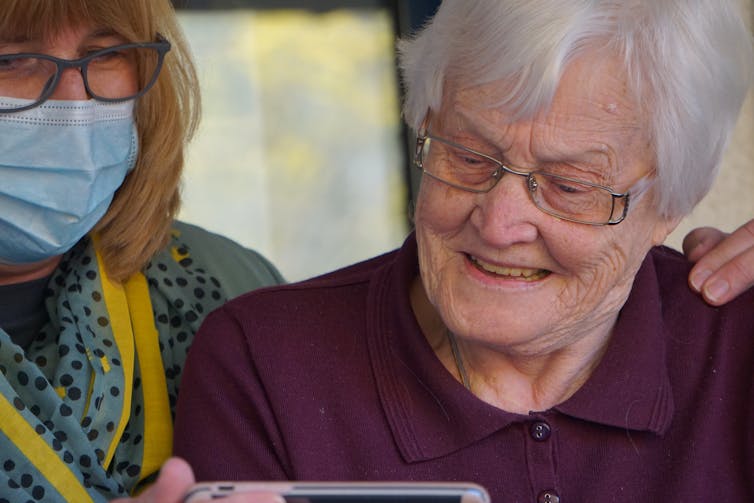Aged care visitor guidelines balance residents' rights and coronavirus risk – but may be hard to implement
- Written by Yun-Hee Jeon, Susan and Isaac Wakil Professor of Healthy Ageing, University of Sydney
One in four Australians who have died from COVID-19 is from an aged care facility.
These deaths show how fatal and fast the spread of the infection can be, and the extreme challenge of containing the virus once a positive case appears in aged care homes.
But there is also community pressure to ease social distancing rules for aged care residents and, for facilities that banned visits, to start allowing family members and friends to see their loved ones again.
To address these concerns, on Friday the aged care sector and consumer advocacy organisations released a draft visitor access code. The code aims to meet the needs of residents to see their families and friends while minimising any risk of spreading COVID-19.
But putting the code into practice will require more staff time to implement them. And while additional funding is on its way, existing workforce shortages may mean a delay to boosting the front-line workforce.
Rights and responsibilities of residents and visitors
According to the code, visitors should be provided with regular updates and information about what’s happening in the facility.
They should also have the option to talk to their loved one via video conference or telephone calls to supplement in-person visits.
But they can’t visit while they have cold or flu symptoms. They must also have had their flu vaccination, wash their hands, remain in the resident’s room or designated area, and to call ahead before visiting. They may also have their temperature taken on arrival.
 The code says residents should have access to video conferencing or phone calls.
Georg Arthur Pflueger /Unsplash
The code says residents should have access to video conferencing or phone calls.
Georg Arthur Pflueger /Unsplash
Each facility will create its own guidelines about where residents can have guests visit – whether it’s in a dedicated room, the resident’s room, a visiting window or something else.
Most visits should be brief. But residents in their final weeks of life and those with an established pattern of care from a family member or friend, for example to help them eat, should be allowed longer and/or more frequent visits.
The code states residents can continue to use public spaces in the facility, including outdoor spaces. But if there is an outbreak, they will need to be confined to their rooms.
Rights and responsibilities of providers
Facilities have the right to refuse entry to someone for a justifiable reason, and to move to lockdown if there is an outbreak.
They have a responsibility to ensure all staff have their flu shots, to facilitate video conferencing or phone calls with family and friends, and enable in-person visits.
These changes require more staff
All of these changes require additional staff to facilitate better communication, video conferencing and increased visits during the pandemic.
Use of new technologies requires a significant amount of staff time. Many residents would need help holding the phone or dialling the number, or using Zoom or Facetime and maintaining a video conversation online. For some residents, such technologies may be a whole new world of experience.
Read more: Our ailing aged care system shows you can't skimp on nursing care
Taking bookings for visit times and screening visitors for temperature, flu vaccination status and hand sanitising takes considerable staff time. As does escorting visitors to the room and back out of the facility while ensuring they’re keeping physical distance throughout.
Staff increases will take time to implement
Residential aged care has long experienced workforce problems, including high staff turnover, failure to attract staff with sufficient qualification and training, and leadership issues, to name a few.
A timely and effective response to the COVID-19 outbreak is likely to be hampered by the sector’s existing challenges.
 Implementing the guidelines will take up more staff time.
Shutterstock
Implementing the guidelines will take up more staff time.
Shutterstock
The Australian government, as the primary funder and regulator of the aged care system, has promised to inject more than A$850 million into the aged care sector in response to the COVID-19 pandemic to:
- address workforce issues, through staff up-skilling, boosting numbers and helping to retain staff
- support new services such as telehealth and the use of technologies to help residents and their families and friends communicate
- continue to improve quality and safety.
However, it’s likely to take some time to see the real effect of this funding on the ground and across the whole sector.
Read more: Why are older people more at risk of coronavirus?
The draft code is a positive step in addressing some confusion around social distancing measures in aged care homes. Many providers have already been implementing the principles in the code, and beyond. But some haven’t.
Hopefully the code will be more broadly and consistently practised by all aged care providers.
Public consultations about the code are underway and close 3pm Thursday May 7. If you are a family member or friend of someone living in aged care, or you’re an aged care provider or staff member, you can raise concerns or views about the code here. The code is due to be finalised on May 11.
Authors: Yun-Hee Jeon, Susan and Isaac Wakil Professor of Healthy Ageing, University of Sydney





